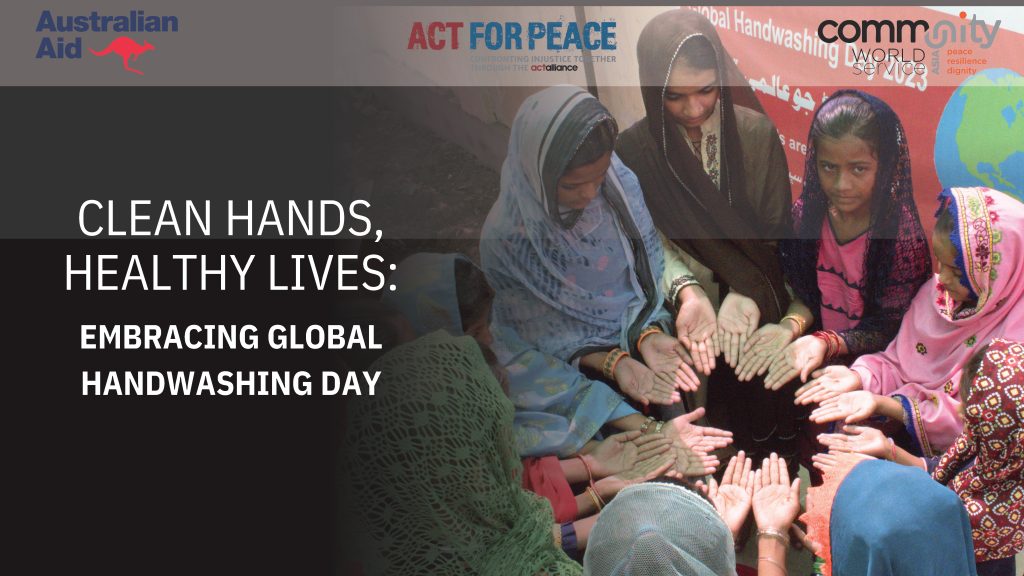
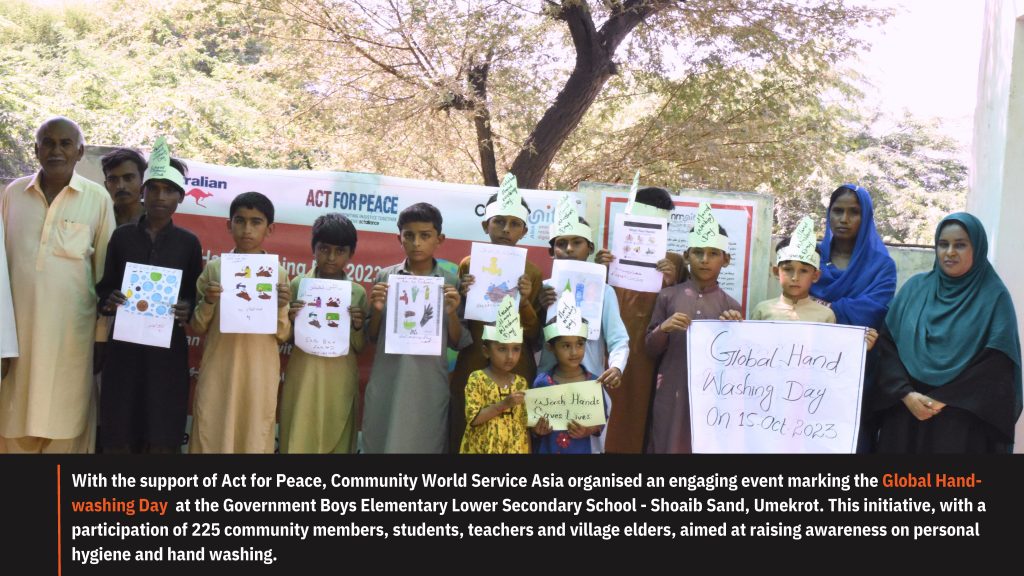
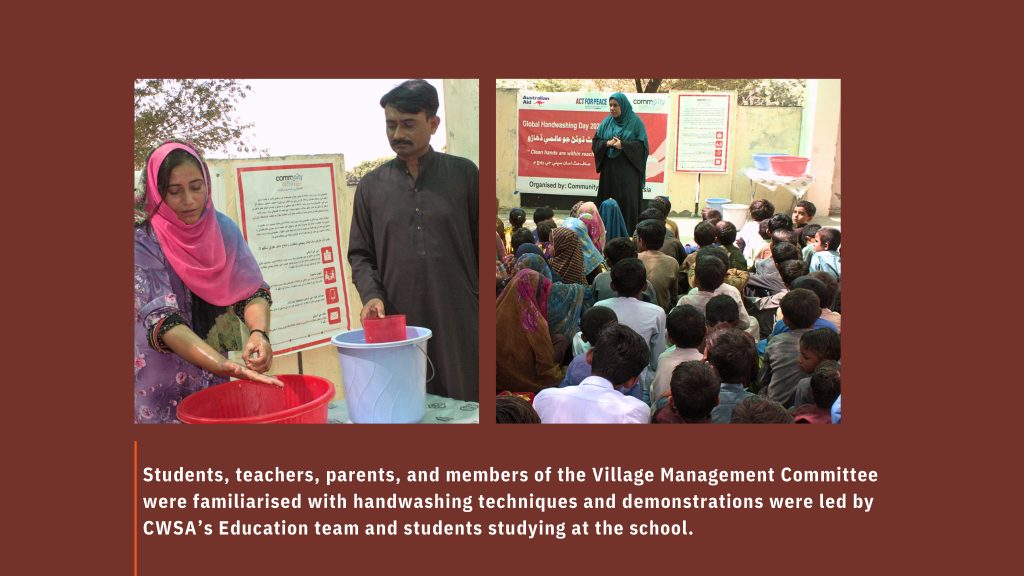
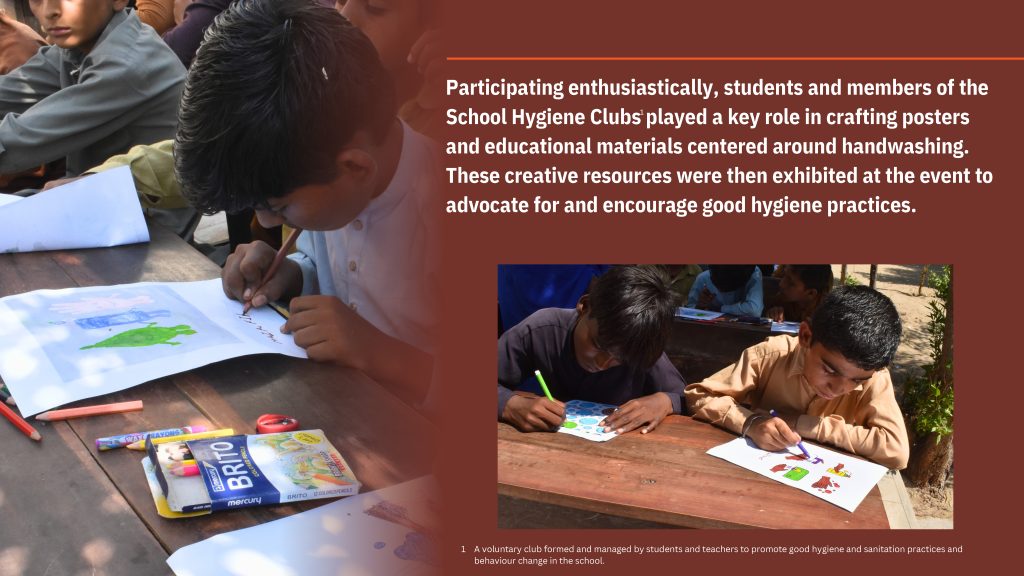
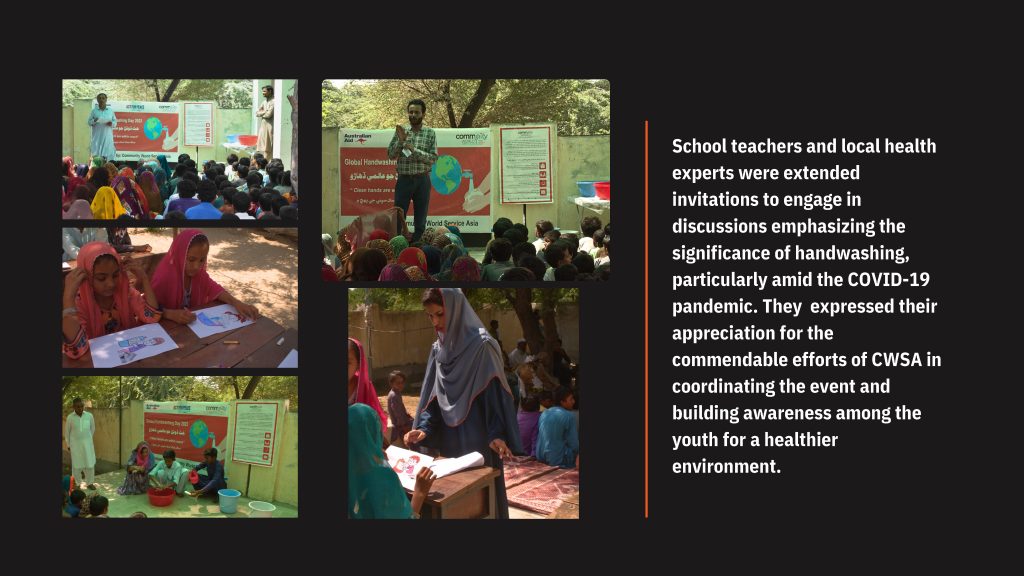
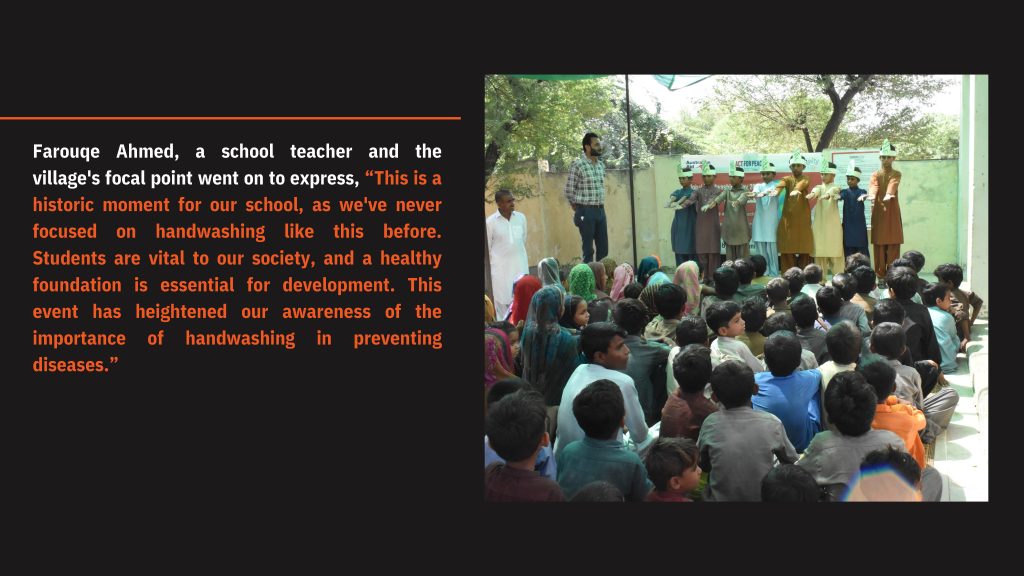
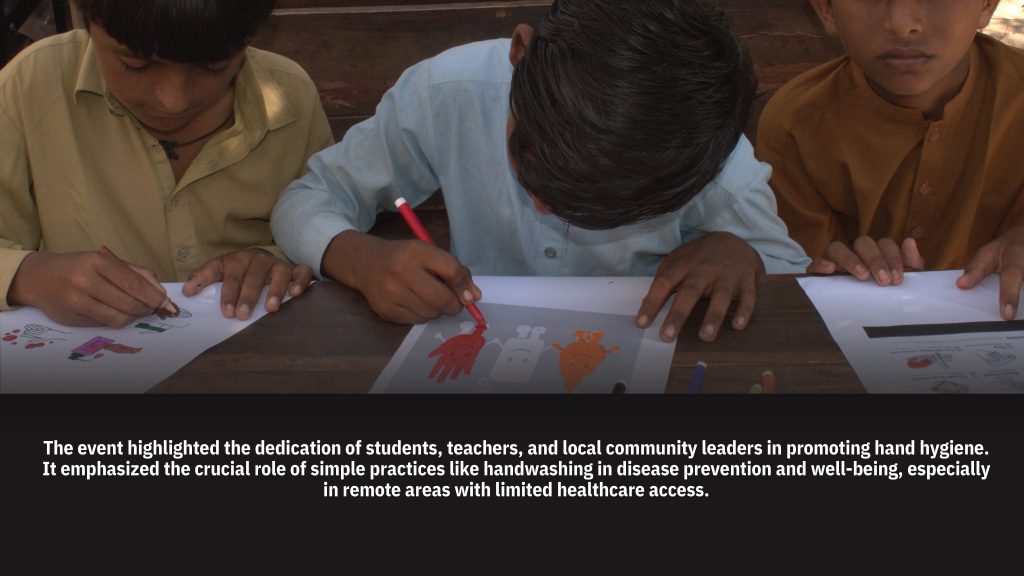







The Polish NGO Forum “Razem” – a platform creating space for multilateral cooperation for non-profit organizations active in the fields of migration and integration, enabling co-creation of solutions for people with refugee and migration experience in Poland and for the Polish society – presents the Voluntary Guidelines on the Nature of Contractual Partnerships between INGOs and L/NNGOs.
The Voluntary Guidelines are the result of the work of the Partnership Working Group, established in March 2023 under the NGO Forum. The Working Group was called for in response to the Open Letter to International Donors And Organizations That Want To Help Ukrainian Refugees In Poland, published by the Polish L/NNGOs in October 2022 and to the broader discussions surrounding the challenges to implementing the localisation agenda in Poland. The Voluntary Guidelines on the Nature of Contractual Partnerships are the result of a series of monthly in-depth discussions – with Polish-English simultaneous translation provided – on topics raised in the Letter and then selected at as the most urgent to build better cooperation between NGOs active inside the Ukraine Refugee Response in Poland. The Voluntary Guidelines include:
While the Voluntary Guidelines play into the global conversation surrounding localisation of humanitarian aid, they reflect the experience from the ground and were meant to tackle the issues from this specific context in a pragmatic and realistic way, taking into account the responsibility of INGOs and L/NNGOs alike. Nevertheless, they can inform the broader humanitarian community, including UN agencies and humanitarian donors, of the operational challenges and possible solutions coming from Polish practice.
Middle-aged Krishen Kohli lives in the hamlet of Hanif Khanzada, ten kilometres from Tando Jan Mohammad in Mirpur Khas district. He is a landless farmer who works as a labourer for a local landowner. He has six daughters and a son. Their son came at number four. “We wanted a few more sons so we kept at it and all God gave us was another three daughters,” he says with a chuckle.
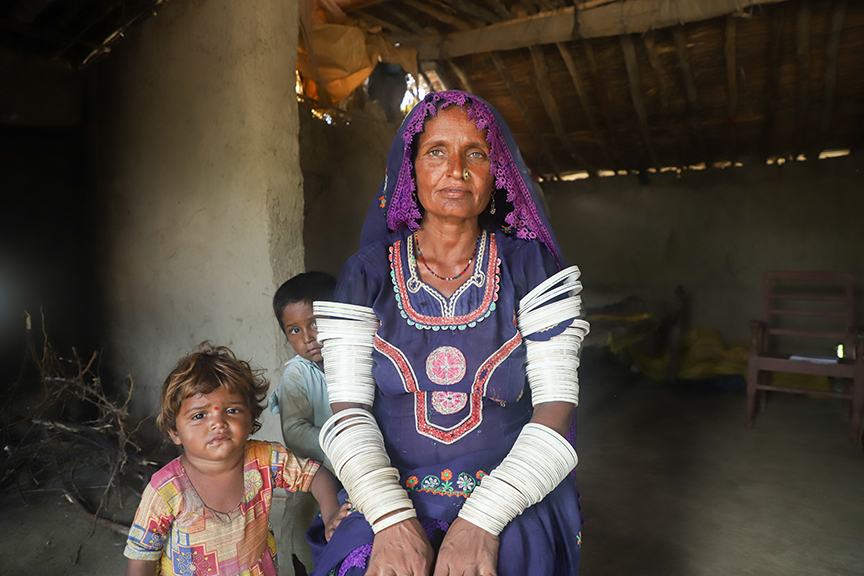
He owns no property; even the home he lives in is built on the landlord’s land and he makes a very meagre living from his work which is irregular. Krishen believes that a child sent into the world is by the will of God and so it is His job to provide them food. Even if that food is only chilli paste and millet bread? “Yes. The child is fated to have only that much.” Krishen’s faith in kismet is as firm as that of anyone who is very poor and has no control over circumstances. In any case, he knows of no family where the man and wife have lived together for fifteen years or more and have fewer than ten children. As for himself, he says he has had enough. He does not want any more children.
Amidst the flood crisis, Kirshan’s residence suffered extensive damage as a result of the flood. In response, he undertook the task of constructing a new dwelling using locally available materials such as wood and mud. Additionally, Kirshan faced health challenges, prompting him to seek medical assistance from the Mobile Health Unit (MHU) of Community World Service Asia due to the inaccessibility of conventional hospitals. The MHU played a pivotal role in providing relief during these difficult circumstances.
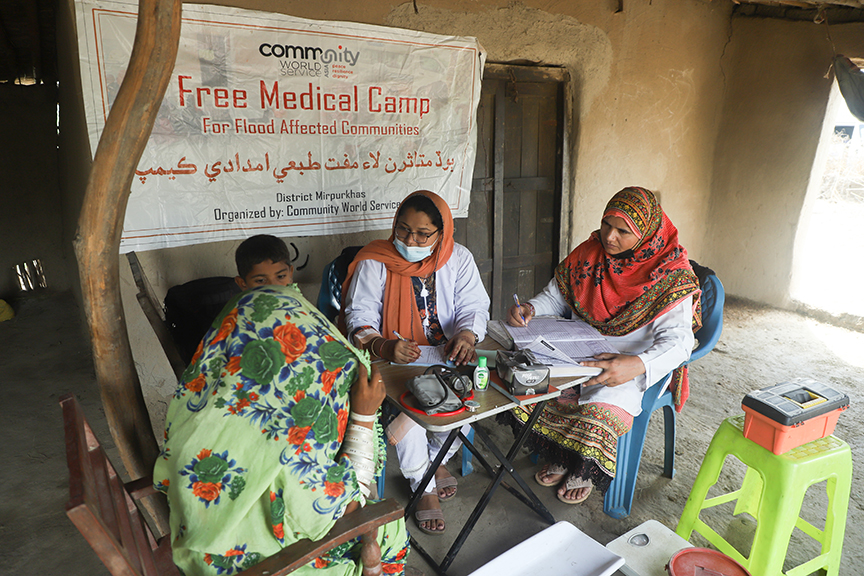
Community World Service Asia’s (CWSA) Mobile Health Unit (MHU) supported by Catholic Agency for Overseas Development (CAFOD) and Disasters Emergency Committee (DEC) was on a follow up visit after the first round. On both occasions Krishen had attended the health awareness session delivered by the CWSA social mobiliser and agrees that he and his wife should have had fewer children.
He was very pleased with the health camp. For the past about seven years, he has had ‘heat in the stomach’, the usual local term for acidity, and constipation but he did not go to the government hospital at Tando Jan Mohammad. Instead, he consulted a private doctor whose fee was PKR 500 (Approx. USD 1.7) and to fill his prescription Krishen parted with PKR 1300 (Approx. USD 4.5). Adding to that the to and fro fare, the cost of the visit went up to PKR 2500 (Approx. USD 8.8). That was beyond the capacity of a poor landless peasant and most of it was taken on loan from the landlord to be adjusted against Krishen’s wages. “The medication lasted me three months and when the course was done, I remained well for another five or six months,” reports the man.
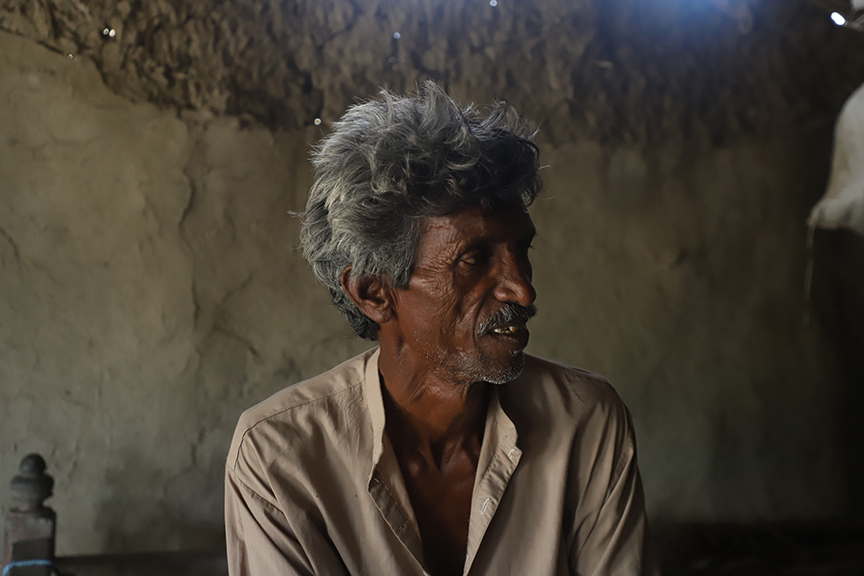
Dismissive of the government facility in Tando Jan Mohammad, Krishen says their free medication never works. Fifteen days earlier, on the first visit of the mobile health unit, he was given five pills, one for a day. And he had never felt better. This was such effective medication, he says, that it has improved his appetite as well. Now he was back for it. The health project had been extended on this very day and the facility was available to the village for more time. If Krishen were to visit the medical practitioner in town in 2023, he estimates he would be set back by about PKR 5000 (Approx. USD 17.6).
Gauri, another fellow resident of Tando Jam, is pregnant with her seventh child and she is not even thirty years old yet. She too has attended the health sessions and heard all about family spacing and that a small family is better fed than a large brood. Like Krishen, she too is not really convinced about a small family being ideal. One can hardly expect that when you live in a social and cultural eco-system that favours huge families.
The first two of Gauri’s babies were delivered by her mother, an experienced midwife. But then she was too old and did not wish to endanger the third child so Gauri went to the government hospital at Tando Jan Mohammad. “The doctor shouted at me, telling me to get back and wait outside. We are poor people and that is how they attend to us,” she complains. She sighs about the expense of coming and going and then being treated badly by the medical staff. After the first visit, she gave up and consulted a private maternity clinic that delivered her next two babies. Each visit delivery cost her PKR 20,000 (Approx. 70).
That put her husband under a huge debt to the landlord and it took a couple of years to repay. In which time Gauri had two more children who were delivered by an inexperienced midwife from a neighbouring settlement. And in September 2023, she was pregnant for the seventh time with plenty of child-bearing years ahead of her!
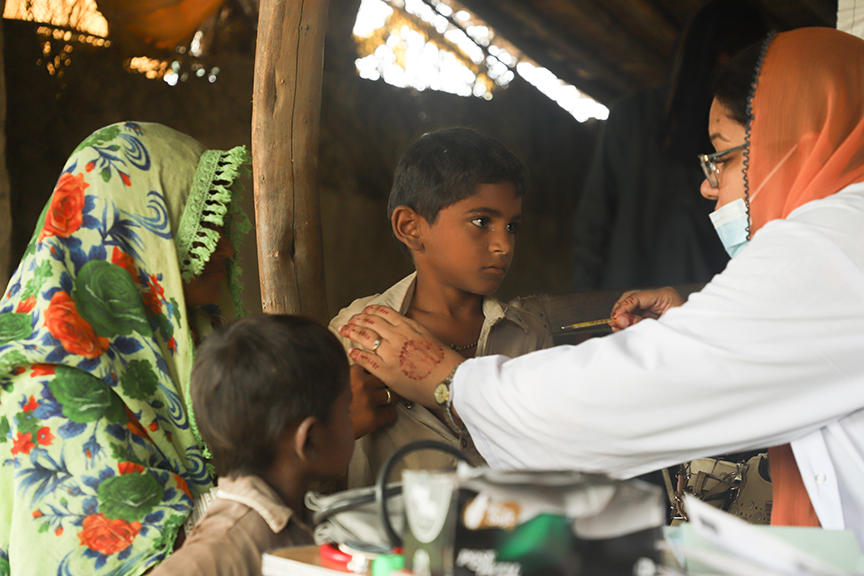
As useful as it is to treat recurrent scabies and respiratory tract infections – the most common complaints in the area – it is necessary to intensify health sessions on sexual and reproductive health of women and young girls in such areas. There needs to be greater emphasis on post-partum care and nutrition of families, women and children alike. Through this project, community mobilisers and health practitioners have engaged with communities on raising awareness and initiating dialogue on these needs but the focus has largely been on providing immediate health care to flood affected communities suffering from diseases and illnesses or needing maternal and neonatal care. There is definitely space to do more.
Meanwhile, the seventy odd women and men waiting in the shade of the trees outside the mobile health unit were happy that they were getting medication that worked. And it was totally free of cost. For women like Gauri who had only a few minutes earlier shrilly complained that government doctors did not even listen to her and others like her, the medical officer in the health facility was an angel.
Sindh Province in Pakistan has seen a wave of climate-induced disasters and other crises in recent years. Drought, Locust Attacks, the COVID-19 Pandemic, and Flooding, have all left district Umerkot and Sindh’s desert region particularly hard hit. Umerkot in particular is historically prone to moderate droughts and is categorised as highly vulnerable according to the Drought Vulnerability Index. With the support of Australian partners, Community World Service Asia is working to provide essential health and quality education services to communities affected by climate-related issues and displacement in Umerkot.
We ask you to fill out this global survey regarding the future of humanitarianism. This survey was put together by a team fromGeorge Washington University, Community World Service Asia (CWSA), and several other partners. The results of this survey will be presented at the launch of the Regional Humanitarian Partnership Week-Asia Pacific organised by the Asian Disaster Risk Reduction Network (ADRRN), Community World Service Asia (CWSA), The International Council for Voluntary Agencies (ICVA) and the United Nations Office for the Coordination of Humanitarian Affairs (UNOCHA) in Bangkok in December, 2023. We kindly ask that you fill out the survey by no later than November 30th, 2023.
If you have questions, please contact Professor Michael Barnett at George Washington University, barnett@gwu.edu.
This Quality & Accountability Learning Forum is a gathering and an opportunity for local, national, and international organisations to come together in a dynamic and interactive space where they can listen, learn, and share their unique experiences and challenges within the humanitarian and development sector. This platform offers a structured, moderated environment where participants can engage in thoughtful discussions aimed at advancing the quality and accountability of their work, all while considering the diverse contexts they operate in.
When: 9th & 10th of December, 2023
Where: Bangkok, Thailand
Apply before: November 5th, 2023
A survivor story
The floods in 2022 left millions of people in Pakistan displaced. Under the ACT Appeal, Community World Service Asia reached out to more than 7000 flood affected people (1099 households) by providing cash assistance to purchase food and essential household supplies. A total of PKR 60,000 (Approx. USD 203.3) was distributed in three separate tranches; in May, June, and July, with affected families receiving PKR 20,000 (Approx. USD 67.3) per month. This monetary support help meet their immediate food needs while also enabling them to save for other essentials, such as medical expenses, clothing, and more.
Hamzu Veerji, a 43-year-old mother of three children from Mir Deen Talpur village in Mirpurkhas district, was one among those supported through life-saving initiatives under this appeal. Hamzu and her husband, Veerji, have been married for fourteen years and have been pillars of unwavering support to each other. They worked together on agricultural fields of a local landlord as a means of livelihood before the flood struck their village. They cultivated and harvested red chillies on one acre of land and received a merger wage between PKR 150 to 200 (Approx. USD 0.51 to 0.68) per day.
Like many others from Mir Deen Talpur, Hamzu and her family was forced to abandon their home and belongings in haste, taking only basic food items (that would barely last them a couple of meals) and their two livestock—a bull and a goat, along with them. With not much money at hand nor a source of running income, the family had to sell their prized bull for a mere PKR 15,000 (Approx. USD 52). “Our bull was very precious to us and had been one of our key source of sustenance for years. We had no choice but to sell it. And that too at a very low price.” Hamzu and Veerji had purchased the bull in 2015 from a fellow villager for PKR 4000 (Approx. USD 14) as an investment to increase their livelihoods, as income from agricultural work was insufficient to provide for their children.
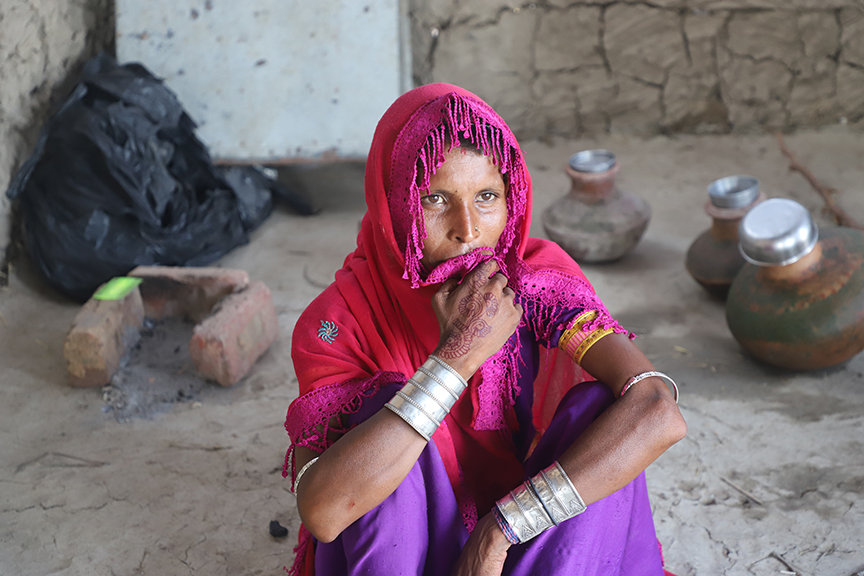
Without their cow and their daily wage, the family lived in a temporary shelter without proper protection on an elevated open ground for two months while waiting for the floodwater in their village to recede. Their village had accumulated up to five feet of water. When Hamzu and family returned to their village, it took them another two months to rebuild their mud-house; that meant more time under the open sky without a structured shelter or a roof to keep them safe. The family of five all lived and slept on just one charpai (a traditional woven bed used across South Asia). The charpai was among the few items they owned that had not washed away in the floods.
Hamzu and Veerji could not bear to see their children suffer these post-flood hardships anymore. But they felt helpless. Building their house again required a lot of time, strength and resources. All they were short on. “Initially, it began with the rain, followed by the challenge of enduring without food and shelter. Later, the heart-wrenching sight of our house reduced to a mere fragment clinging to life greeted us upon our return. Our children were profoundly affected, having already endured a great deal. My husband, Veerji, and I had to act swiftly to reconstruct our home, but the process of mixing water and mud was time-consuming, and allowing the structure to dry also required patience. Nonetheless, we made every effort to expedite the process,” shared Hamzu.
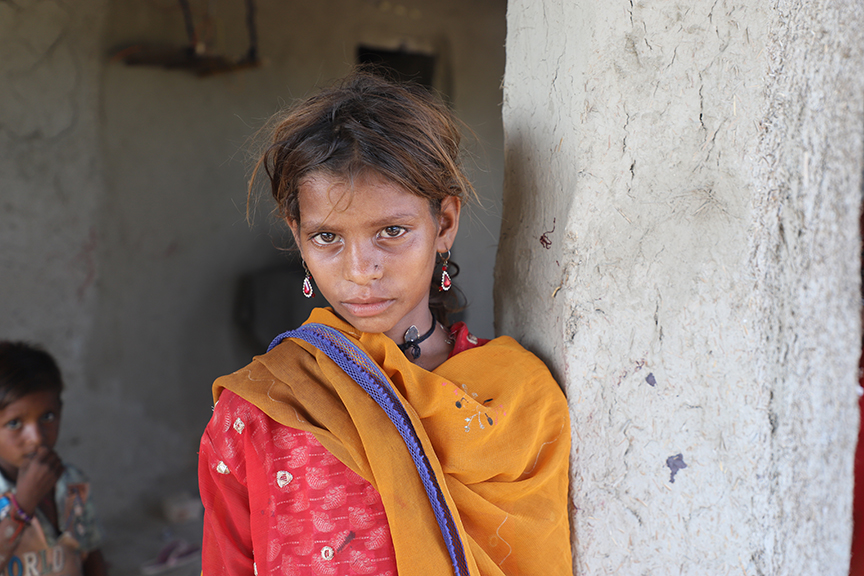
Access to clean water has always been a scarcity in Mirpurkhas. And the floods further exacerbated this issue. This meant increasing health problems among affected communities in villages like Mir Deen. The nearest well to fetch water from is at a six kilometres walk from Hamzu’s village and unfortunately this water is not even clean. This was a major challenge and concern for Hamzu and Veerji who really just wanted to ensure the good health and safety of their children. Luckily, with financial support from Community World Service Asia (CWSA) they were able to purchase clean drinking water and some groceries to stock up.
From the first instalment of PKR20,000 received, they spent ninety percent of it (Approx. USD 62) on groceries and drinking water and saved the remainder for future needs. “We used the money to buy sugar, tea leaves, rice, vegetables, and a few gallons of water, as the water we collected from the field was undrinkable. We could only use that to prepare the mud for our house.”
Hamzu prioritised purchasing abundant food for her family to protect her children from the risk of malnutrition, a serious concern in rural Sindh, especially among children in their formative years. Her youngest child, Meher, who is just 4 years old, had lost a lot of weight due to the lack of proper nutrition after the floods. Hamzu was now relieved that her children could consume nutritious meals and regain their ailing health.
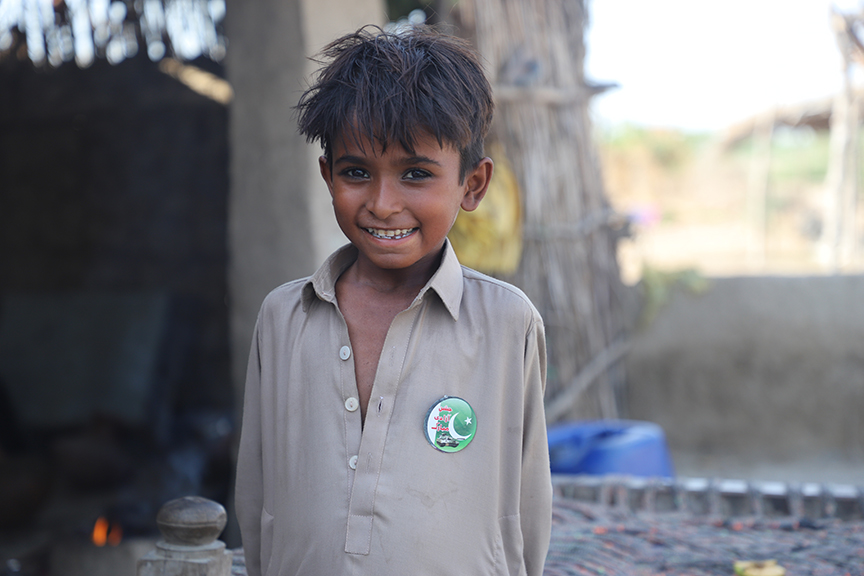
The couple utilised the second instalment then for purchasing another goat (PKR 5000), to buy clean clothes (PKR 5000) for their children and the remaining on restocking food items. Hamzu explained their approach to managing the aid, stating, “With each instalment, we bought groceries and saved between PKR 2000 to 3000 for future needs, as we knew this assistance was not permanent. I discussed with Veerji the importance of saving money so that we can buy another bull, as it is the only way we can foresee now to improve our economic situation.”
Following the floods, Hamzu and Veerji found themselves without work and income but now they own two goats that provide milk, which they sell to fellow villagers. They have saved a total of PKR9000 (Approx. USD 30.5) up until now from the cash support provided to them. Hopefully in a few more months this hard-working couple will be able to buy a bull which will enable them to expand their income by selling its milk in the market.
Despite the hardships, Hamzu and Veerji value maintaining stability in their life for their children. With the support provided under the ACT appeal, they were able to rebuild their life step by step, with dignity and respect. Through careful budgeting and prioritising their family’s well-being, Hamzu and Veerji not only overcame their flood-imposed suffering but also created opportunities for a brighter future for their family.
In a quaint little village named Birkhio in Umerkot, a woman named Pohno experienced loss and suffering as her cherished goats, a primary source of livelihood for her, fell prey to skin diseases and infections. The devastating floods in 2022 had not only damaged lands and taken lives in the area but had also led to a spread of infectious diseases among people and livestock both.
Sadly, Pohno’s animals were among the many thousands who had succumbed to the post-flood epidemic. As a widow and single mother of three adult children, all of whom had their own responsibilities now, Pohno found herself in a challenging situation – without any means of income.
“My primary source of livelihood revolved around the livestock we possessed. But my world was swept away along with the floods that struck Birkhio last year. The floodwaters contaminated our surroundings, leaving our goats exposed to a range of harmful pathogens. The skin diseases and infections ultimately led to the demise of most of my livestock,” lamented Pohno. She had heavily relied on her goats for sustenance and income, and their loss had left her devastated. Pohno owned a total of 35 goats, 20 of which perished due to underlying issues. The primary problem leading to their demise was the insufficient supply of proper nutrition to their bodies. The remaining 15 goats were only able to survive because Pohno started providing them with extra care.
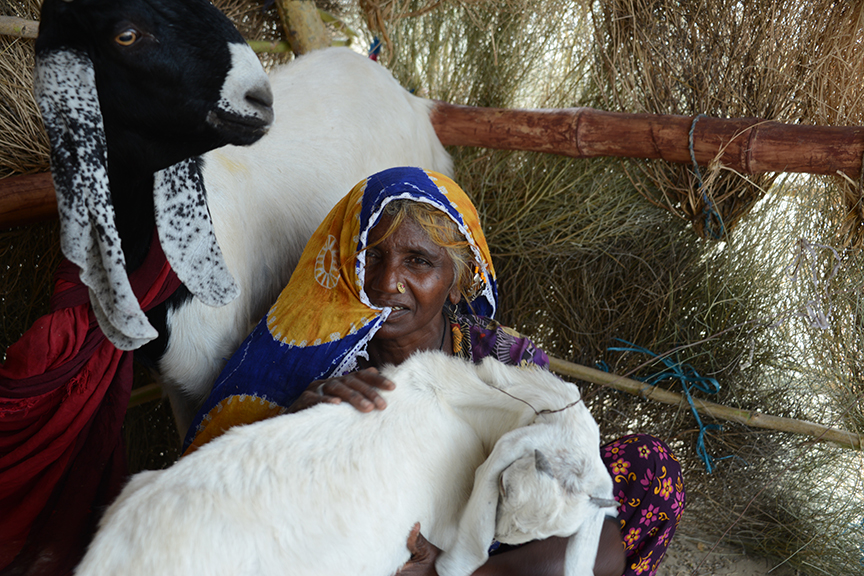
To support households and individuals affected by the economic and social impact of the floods, Community World Service Asia and its long-term partners, Diakonie Katastrophenhilfe (DKH) initiated a humanitarian project to provide essential relief resources that would be sustainable but also income-generating.
As a participant of the project, Pohno received animal food and health kits that were designed to retain and improve the health of her remaining goats. These kits included medicines, vitamins, and hygiene products specifically tailored to increase the well-being of local livestock. Pohno also received Hydroponic seeds, which helped her produce a more nutritious diet for her livestock. “The use of Hydroponic seeds has been something new and very innovative for us. It is a novel approach that has incorporated specific leaves into the goats’ diet, enhancing their overall health and improving their skin conditions.”
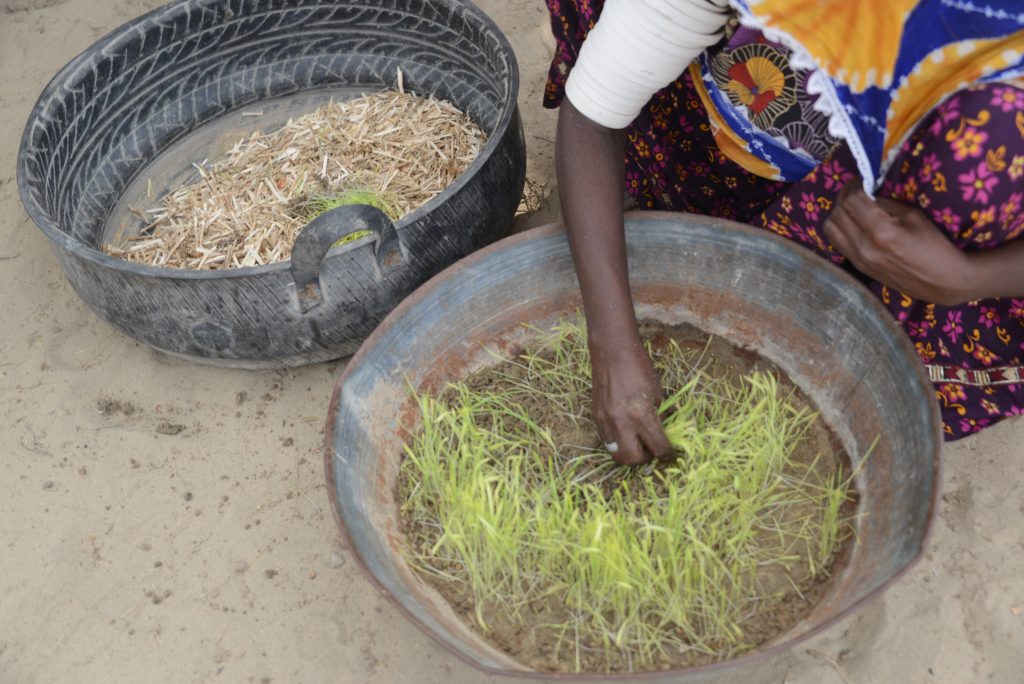
During dry seasons in Umerkot, there is a huge scarcity of nutritious fodder for livestock, leaving them with little to consume apart from dry leaves, making them weak and leaving them hungry. Hydroponic, on the other hand, is a type of fodder that takes approximately ten days to grow and is then fed to the goats. It involves mixing Hydroponic grass with dry grass to provide the goats with enhanced nutrition. This proved to be a pivotal factor in significantly improving the health of Pohno’s goats. “Incorporating these leaves into the goats’ diet had a profound impact. It provided the goats with a valuable infusion of essential nutrients and antioxidants, strengthening their immune systems and equipping them to combat infections effectively. The combination of this improved diet, along with the medication and hygiene measures supplied in the health kits, resulted in a remarkable transformation in the overall health and well-being of the goats.”
Pohno was among sixteen individuals who received training under the project to strengthen the livelihoods and resilience of communities that lived below poverty and those that were most vulnerable to climate change impact. This training became instrumental in familiarising participants with the use of hydroponic seeds and their advantages for livestock survival. It also helped communities learn about proper feeding practices and timings necessary for improving the health of their livestock.
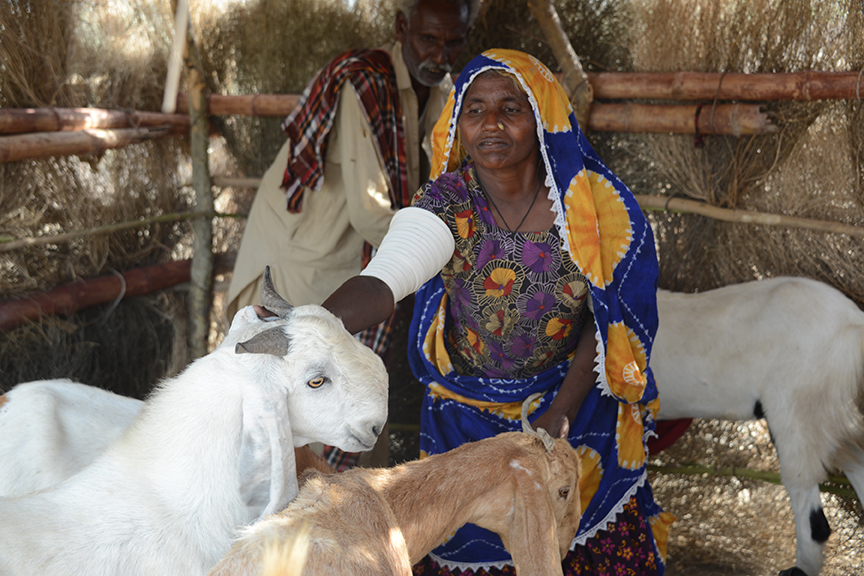
As the health of Pohno’s goats improved, they began to produce better-quality milk. This not only benefited Pohno’s own household (where she takes care of her ailing daughter) but also served as an additional source of income for her. The recovery of her goats instilled a renewed sense of hope and strength in Pohno’s life, empowering her to regain control over her livelihood.
Community World Service Asia is a non-governmental organization, which implements humanitarian and development activities in Pakistan. We have been effectively implementing development projects in KPK, Punjab, and Sindh. Community World Service Asia is registered under the Societies Act of 1860, bearing Registration No. KAR 0072 as a local NGO recognized by the Government of Pakistan. Our headquarters are located in Karachi, with liaison offices in Islamabad, Lahore, and Umarkot. Additionally, we have signed a Memorandum of Understanding (MOU) with the Ministry of Economic Affairs Division (EAD) in Islamabad, under the Government of Pakistan.
Community World Service Asia is inviting sealed quotations for the construction of 15 solar powered water points at UC Faqeer Abdullah and Kejarari, Umerkot. The Bill of Quantities (BoQ) documents can be found within the documents as Annexure – A.
The deadline for the submission of sealed bids or through email cwsasia.rfq@gmail.com is Sunday, November 5, 2023, by 15:00 hrs.